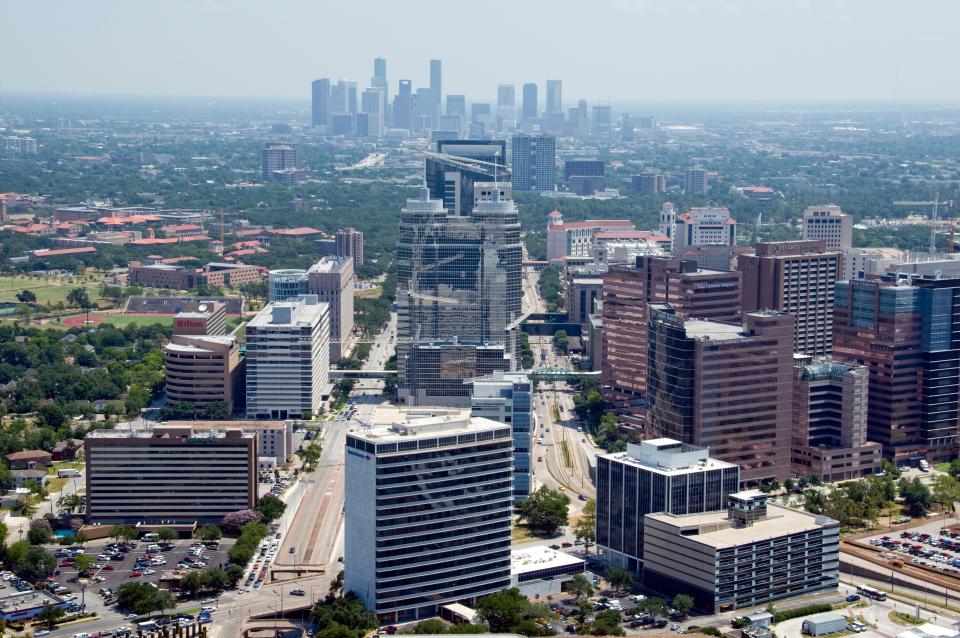After being in coma and nearly dying from lupus, Texas student fights back for graduation
The footage from the ceremony quieted from routine clapping for the graduates crossing the stage at Xavier University of Louisiana in New Orleans as the university president and everyone else in the auditorium spotted Aiyana Jones arriving in a wheelchair.
The crowd at the historically Black Catholic university's Convocation Center rose to its feet for the 22-year-old graduating with a biology degree and a Spanish minor.
The white frill on Jones' mortarboard cap shared a simple reminder in white-on-gold lettering: “I believed I could so I did!”
Jones' presence on that stage in May was a compelling testimonial to her determination amid the daunting obstacles she'd faced during the two years leading up to that moment. What began as a headache while she was studying, on her path to becoming a doctor, turned into brain swelling and led to her being in a coma. Since last spring, Jones has defined her recovery as she sought to combat an autoimmune disease that she learned after the fact ran in her family.

Understanding the brain: A new map of the human brain offers insights, clues to future treatments.
A headache turns into a coma
In the summer of 2021, Jones was visiting home in Houston, taking summer school courses so she could graduate early and get a head start on her career. She had been on a pre-med track at her HBCU, planning to attend medical school and become an anesthesiologist.
That summer she started having excruciating headaches and a rash broke out on her face, she said in email responses to USA TODAY. She went to the hospital twice to seek a diagnosis, and both times staff there sent her home without one.
On June 21, 2021, she was studying for an organic chemistry final when the headache returned. She decided to take a nap. She told her mom that she’d lie down in her room upstairs, and her mother said to let her know when she’d be ready to eat.
Hours passed. Jones didn’t respond to her mom calling from downstairs. When Jones' father got home from work, her mother asked him to check on Jones. When he went upstairs to her bedroom, his daughter's words were slurred, and, he later told a doctor, she wasn't making sense.
Her parents called for an ambulance. That’s when Jones started drifting in and out of consciousness.
After a couple of days in the intensive care unit at Memorial Hermann in Houston, she was placed in a medically induced coma on a ventilator to determine the cause of her brain swelling. Doctors determined it was encephalitis caused by systemic lupus erythematosus, or SLE, a rare disease in which her immune system was attacking her body and causing her brain to become inflamed. The swelling caused her to lose most of the functions controlled by the brain, including the ability to breathe and swallow.
New research: Monkey kept alive for 2 years with pig kidney offers hope for humans awaiting transplants

What is lupus?
Lupus, a lifelong condition, is more common in women than men, three times more common among Black women than white women and more pronounced in younger ages, the Lupus Foundation of America estimates. About 200,000 Americans have lupus, according to the Centers for Disease Control and Prevention.
Symptoms include rash, fatigue, unusual hair loss and memory problems. With lupus, the immune system can’t tell the difference between pathogens and healthy cells, so the body begins attacking itself.
It’s unclear what causes lupus, though it’s not contagious. The CDC says that genetics play a part, but research is ongoing into possible environmental and hormonal factors, as well as triggers in the immune system.
SLE, the more serious form of lupus and the one Jones was diagnosed with, has higher rates of mortality among Black people. The Lupus Foundation said Black patients tend to have more disease damage and a higher rate of comorbidities.
Jones remained in a coma at Memorial Hermann’s trauma center for weeks. Based on the doctor's suggestion, the family prepared for the worst, said her aunt Paulette Jones, 67. Visits were limited due to the COVID-19 pandemic, so family members rotated sitting with Jones.
Her cousin Ashley Jordan, 37, worked at the hospital and had seen families like her own struggle with relatives whose lives were in limbo. Jordan checked on her cousin during her shifts throughout Jones' stay.
“You see how just one injury can change a person's life forever and you witness the miracles,” Jordan said of her work. "The support system that you have makes all the difference.”
Road to recovery
On Aug. 5, 2021, doctors pronounced that Jones was in a persistent vegetative state and transferred her for further treatment at TIRR Memorial Hermann’s Brain Injury and Stroke Program. She appeared to be awake but had no signs of awareness of what was going on around her. She did not talk or move, and she could not swallow, said Dr. Jean Woo, an attending physician specializing in brain injury rehabilitation at TIRR Memorial Hermann who began working with Jones upon her arrival.
Woo said Jones was unable to interact with staff. Jones recalled over email that she was conscious when she arrived at the facility, but she couldn’t move her body when asked.
The goal of the consciousness center is to properly diagnose cases that may not be understood in the ICU, which is meant to keep someone safe and alive.
It was Woo’s first time seeing a patient experience encephalitis, or brain swelling, from lupus. She ordered clinical tests to understand what was ailing Jones. She also continued tracking for signs of movement and whether Jones could respond to commands, which would mean her brain had comprehension and access to language. Soon after her arrival on the unit, Jones began to move her left arm on command. Hospital staff later found Jones could move her head on command. This began with yes or no questions, with a head nod for “yes,” and head shake for “no.”
The next phase of Jones' recovery involved the staff asking “egocentric” questions about Jones. They'd use her nickname and ask if her name was “Yani.” They'd also try questions that might lead her to share false information, for example, if her name was “Sarah” to validate the quality of her responses.
Five days after she was admitted, on Aug. 10, doctors wrote in her charts that Jones was fully conscious based on standardized testing. It's alarming to family members to hear about a radical turnaround such as this, but Woo said the misdiagnosis – that a person is in a vegetative state – is regrettably very common.
Caretakers at the hospital hooked Jones up to a laser that she could use to communicate by spelling words. The laser, like a cat pointer, was attached to Jones’ head. Staff directed her to aim it at a letter board on the wall; they asked her to spell words using her head. The board gives patients more opportunities to communicate beyond a simple yes or no, Woo said.
Jones didn’t like the laser, Woo said, so hospital staff moved the letterboard closer to her. Staff would point to a row of letters to spell a word that Jones would affirm was what she wanted to spell. It took time, but it was a big step, Woo said.
Jones proceeded with physical therapy and occupational therapy, learning to sit up and move her body. She's still working on improving the function in her right arm, Woo said. With ongoing therapy, Jones typed on a large keyboard with a stylus and she now types on her cellphone and tablet.
Jones didn’t learn that lupus ran in her family until after the coma. Using her iPad in the hospital, Jones asked her aunt if she knew that her grandmother had, had lupus. “I told her we did, but we didn’t realize the magnitude of it,” her aunt said. Jones grandmother, on her father’s side, died in her early 50s from the disease.
Jones' aunts and mother, Charlene, worked with her during her recovery, helping her progress to moving with a wheelchair. She hadn't conquered conversation yet, but she messaged over a tablet or her cellphone using her left arm, writing to her family members that she wanted to complete her degree at Xavier.

Back to school
Her aunt Paulette, a retired educator, began making calls to Xavier, getting in touch with the disability department to facilitate Jones’ education. She wouldn’t be returning to New Orleans; instead, with their permission, she'd study remotely from her home in Houston.
Michelle Boissiere, the head of the biology department at Xavier, received a message from Paulette that Aiyana wanted to complete her degree. She was three-fourths done, Boissiere said.
Half a year after she was placed in a coma, Jones returned to her studies for the spring 2022 semester. She didn’t find online coursework difficult amid the pandemic. She's already adjusted to learning from home during her sophomore year of college.
There would be compromises. Jones learned she would have to switch her biology degree from a Bachelor of Science to Bachelor of Arts because she was unable to do laboratory work. One class had to be created for her because she ran out of online courses available that would let her complete her degree, Paulette Jones said.
“Whatever I needed from them to help her, it was done,” the aunt said.
Boissiere initially worried about Jones being unable to have verbal communication with her teachers. But faculty told the department head that Jones not only submitted her coursework, she was passing.
“She is a highly intelligent young woman,” Boissiere said. “And it is a testament to the fact that she was determined to do the work to complete her education.”

Another challenge
Just a week before graduation, Jones’ older sister Shanna, 37, died of lung cancer in Delaware. Jones' first inclination was to skip the ceremony. She and her family were in deep mourning. Several family members had left town to attend her sister’s funeral.
But family members convinced her to celebrate her achievement at Xavier in New Orleans.
Her aunt Paulette helped make her cap stand out.
Jones is still recovering, doing physical therapy to gain function in her right arm and working on recovering her ability to speak. Woo recently referred Jones to driving rehabilitation, to assess whether she can drive with a modified vehicle.
Jones has new goals on the horizon. She’s pursuing a master's in health informatics from Xavier.
Her goal, she wrote, is to work with people to manage their autoimmune diseases. It's a journey she knows better than anyone.
Eduardo Cuevas covers health and breaking news for USA TODAY. He can be reached at EMCuevas1@usatoday.com.
This article originally appeared on USA TODAY: After nearly dying from lupus, this Texas woman graduated from college

